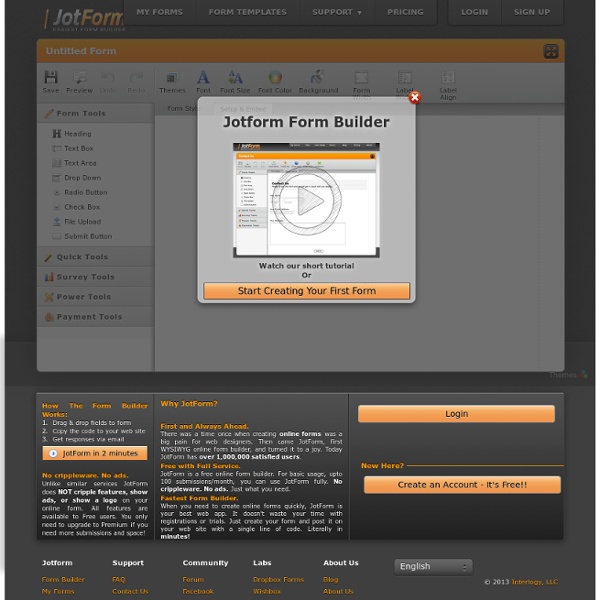



What is TPACK? Abstract This paper describes a framework for teacher knowledge for technology integration called technological pedagogical content knowledge (originally TPCK, now known as TPACK, or technology, pedagogy, and content knowledge). This framework builds on Lee Shulman’s construct of pedagogical content knowledge (PCK) to include technology knowledge. The development of TPACK by teachers is critical to effective teaching with technology. LimeSurvey Documentation Wiki LimeSurvey allows users to quickly create intuitive, powerful, online question-and-answer surveys that can work for tens to thousands of participants without much effort. The survey software itself is self-guiding for the respondents who are participating. This manual is thus focused at how to install the application, administer the installation, and support survey creators, administrators and report generation users alike.
[bizodo] Online Form Builder and Project Management Software Before we can continue,we need a little info from you... Please enter your valid email address below. We'll set you up with an account to store your document and use this email address to update you on activity related to it. Twenty Ideas for Engaging Projects The start of the school year offers an ideal time to introduce students to project-based learning. By starting with engaging projects, you'll grab their interest while establishing a solid foundation of important skills, such as knowing how to conduct research, engage experts, and collaborate with peers. In honor of Edutopia's 20th anniversary, here are 20 project ideas to get learning off to a good start. 1. Flat Stanley Refresh: Flat Stanley literacy projects are perennial favorites for inspiring students to communicate and connect, often across great distances. Now Flat Stanley has his own apps for iPhone and iPad, along with new online resources.
Developing Dynamic Surveys Smart surveys that present the respondent with questions and answers specifically tailored to each individual respondent improve response rates and improve the integrity of collected data. QuestionPro.com offers the ability to create smart surveys using a simple point and click interface. Many techniques may be utilized when developing surveys that dynamically direct a respondent through a survey based on the respondent's prior survey responses. The standard example is Simple Branching.
Project Based Learning By Wayne D'Orio Here’s a riddle: Imagine there is a learning technique proven effective through 100 years of use that is now enhanced by the power of today’s technology. Imagine it can excite learners to continue their work well past the parameters of the school day. What is it, and would every school in the country do it? It is project-based learning, and the answer is yes, and no. Project-based learning can be traced back to John Dewey and it has come and gone since the early 20th century.
How to Make Forms, Surveys, and Quizzes in Google Docs and Spreadsheets or Google Apps Want to find out what your coworkers want for lunch? Need to get feedback for your training session? Want to find out which movie your friends want to see on Saturday? Common Core Georgia Performance Standards Georgia has joined 44 other states, the District of Columbia (D.C.), and 2 territories, along with the Department of Defense Education Activity, in formally adopting a set of core standards for kindergarten through high school in English language arts, mathematics, and grades 6-12 literacy in science, history/social studies, and technical subjects. The CCGPS provide a consistent framework to prepare students for success in college and/or the 21st century workplace. These standards represent a common sense next step from the Georgia Performance Standards (GPS). What do CCGPS mean for Georgia? The CCGPS for English Language Arts, mathematics, and literacy in science, history/social studies, and technical subjects will ensure that all Georgia students have an equal access and opportunity to master the skills and knowledge needed for success beyond high school.
Pourquoi Stories: Creating Tales to Tell Why ReadWriteThink couldn't publish all of this great content without literacy experts to write and review for us. If you've got lessons plans, activities, or other ideas you'd like to contribute, we'd love to hear from you. More Find the latest in professional publications, learn new techniques and strategies, and find out how you can connect with other literacy professionals. Nets Standards Education technology standards to transform learning and teaching The time for major change in education is now. In a world where rapid advances in technology have a profound impact on the ways we work, communicate and live, education has struggled to keep pace. The ISTE Standards work together to support educators, students and leaders with clear guidelines for the skills and knowledge necessary to move away from the factory model. These are not the typical boxes educators need to check. They provide a framework for rethinking education, adapting to a constantly changing technological landscape and preparing students to enter an increasingly global economy.
Social Media in Education: Resource Roundup Creating Social Media Guidelines A Guidebook for Social Media in the Classroom, by Vicki Davis (2014) Davis, in the first half of a pro-and-con discussion about social media in the classroom, positions it as a vital life skill and provides 12 positive examples of classroom use. For the second half of the discussion, read this post by Ben Johnson: "Too Much Technology and Not Enough Learning?" The Digital Lives of Teens: What Time Is It? Now! by Matt Levinson (2013) In this first installment of his Digital Lives of Teens series, Levinson considers the problem of translating the teenage urgency of 'always on' into the mindfulness of 'being present.' Digital Nativism Prensky's Digital Nativism With an insulting tone worthy of the original American nativists who hated immigrants (especially Catholic ones), Marc Prensky speaks of pre-iPod humans (digital immigrants) contemptuously. (Prensky's work) In a rather shallow piece lacking in evidence or data, Prensky offers the terms "digital natives" and "digital immigrants" to set up a generational divide. His proposition is simple-minded. He paints digital experience as wonderful and old ways as worthless.